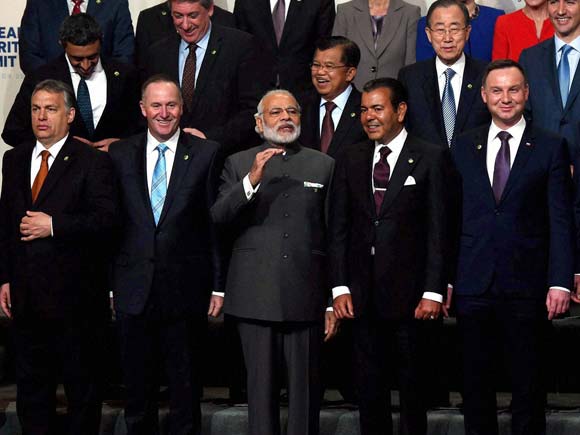India's Efforts To Single Out Pakistan On Terror Remain Unsuccessful
NEW DELHI: Following the BRICS summit where Russia and China walked home without giving in to India’s push for singling out Pakistan for specific mention on terrorism, the United States, United Kingdom and even Myanmar have dealt India’s efforts a big blow.
The United Kingdom, in fact, praised Pakistan on Tuesday for taking “consistent action” against terror groups. The statement came in response to a petition on the British government’s website, that urged the UK to take strong action against Pakistan for aiding and abetting terrorists and listed terror attacks in India and elsewhere. The petition garnered more than 20,000 signatures, necessitating the British government to take it up under a procedure that requires a response to petitions with more than 10,000 signatures.
The official response to the petition, posted by the Foreign Office, was met with disappointment by the Indian community that had supported it, especially in light of British Prime Minister Theresa May’s upcoming November visit to India.
“The UK and Pakistan have a shared interest in the battle against terrorism. We are committed to working together to combat both the terrorist threat and the extremism that sustains it, in a human rights-compliant manner,” the response said. “The UK regularly highlights to Pakistan, at the highest level, the importance of taking effective action against all terrorist groups operating in Pakistan, as Pakistan has committed to do. We recognise the significant sacrifices that Pakistan and its people have made in combating terrorism,” it added.
Meanwhile, the United States refrained from commenting on Prime Minister Narendra Modi’s recent statement that strongly condemned Pakistan and called the country a “mother-ship of terrorism.” PM Modi had made the statement at the BRICS summit in Goa. In fact, the US took the opportunity -- when asked about the comment -- to reiterate the importance of peace and dialogue between the two countries.
"I have to admit, I have not been briefed on those comments. What I can say in general is that we have encouraged India and Pakistan to look for ways to resolve peacefully their deeply-held differences on a range of issues," White House Press Secretary Josh Earnest told reporters in response to a question on PM Modi's remarks.
BRICS in fact failed to go India’s way in respect to singling out Pakistan on the issue of terror, with the declaration issued by the countries collectively failing to mention Pakistan, despite media reports leading up to the BRICS summit stressing on the fact that India would ensure that Pakistan and cross-border terror are the key issues up for discussion. Despite the media frenzy and assurances, the fact that Pakistan would not be singled out was indicated just before the summit, at bilateral meetings when Prime Minister Narendra Modi was unable to extract an assurance from China’s President Xi Jinping of removing the technical hold on the UNSC for designating Jaish-e-Mohammad chief Masood Azhar a terrorist.
Following the summit, China even defended Pakistan and made clear at the end of the summit that it was not prepared to allow Islamabad to be at the receiving end of the BRICS stick.
To a question at a briefing in Beijing : "At yesterday’s BRICS Summit (in Goa), Indian Prime Minister said that Pakistan was the “mothership” of terrorists. As a good friend of Pakistan, do you think this is a fair characterization of Pakistan’s security problems by India?"
China replied: "China holds a clear and consistent position when it comes to fighting terrorism. We oppose terrorism of all forms and maintain that terrorist threats tackled through enhanced international cooperation in order to uphold peace, security and development of various countries and the region. We are also against linking terrorism to any specific country, ethnic group or religion.Both India and Pakistan are victims of terrorism. The international community should respect the enormous efforts and sacrifices made by Pakistan in fighting terrorism."
The giant UN Security Council member made it clear that it was not prepared to walk the extra metre, let alone a mile, insofar as Pakistan and terrorism was concerned. Sources said that it seemed to have systematically blocked Indian efforts to include Pakistan, or at least cross border terrorism, in the Goa BRICS Declaration that basically reiterated what has been said by the world before on terrorism, and the need to cripple it.
It is clear that despite the huge media frenzy stressing that India has managed to single out Pakistan on terror, the reality is that New Delhi has remained unsuccessful in doing so. Adding to the issue on Tuesday, Myanmar’s de-facto ruler Aung San Suu Kyi said that terror, not nations, need to be isolated.
Speaking in reference to India’s campaign to isolate Pakistan over using cross-border terrorism, Suu Kyi said, “Terrorism is rife all over the world, so I think it’s terrorism we need to isolate and to eliminate. I do not like to think in terms of individuals or organisations or countries, although these come into the equation as well… Basically what we’re trying to get rid of is terrorism, the use of terror to achieve one’s ends… I’m certainly not in favour of violence, let alone terrorism and I think we all need to work together to find the answer to why people resort to terrorism. What is it about, it’s not as easy as some people think it is, people resort to terror because they like terror – no, it’s not like that.”





